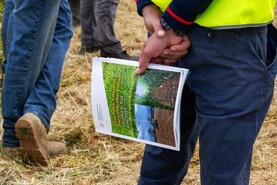The risk of bringing disease on to a farm is typically at its lowest level where a closed flock policy is in place. The disease risk can also be greatly reduced where a good biosecurity policy is in place and where background information on the flock you are purchasing from can be obtained.
This was the view of Donal Lynch, Slieve Bloom Veterinary, speaking at Tuesday’s beef and sheep open day on Tullamore Farm.
A comprehensive quarantine programme is not cheap to administer but as Donal points out it is a fraction of the cost of dealing with a disease outbreak.
Remember, sheep brought to a sale and returning home unsold will also present health risks.
Tullamore Farm has been purchasing sheep since the project commenced in 2017. The farm is aware of the risks but to secure the type of sheep desired for the demonstration project, there is no other option but to purchase.
The quarantine protocol developed by farm manager Shaun Diver and Donal is comprehensive and costs in the region of €16 to €17 per purchased animal. It is summarised as below.
Key practices
On arrival to the farm, every sheep is transferred straight to straw for a period of typically 48 hours. During this time, the following practices take place.
Worm control: the farm administers a double treatment to reduce the risk of bringing in worms which are resistant to anthelmintic classes. In the past, this has been Zolvix and a macrocyclic lactone (clear) or levamisole (yellow drench). The farm will this year consider sourcing Startect for the quarantine drench from Northern Ireland. Fluke control: the farm is mainly a dry farm but there are lower-lying or areas prone to flooding and harbouring a fluke burden. Two treatments are administered, typically being a closantel-based product and trichlabendazole. Lameness: sheep are monitored closely for signs of lameness over at least the first month and purchased sheep are transferred at the optimum timeframe on to the lameness vaccination programme. Sheep are also footbathed regularly, following arrival with hoof health checked and any suspect issues investigated. Abortion-causing agents: the farm has purchased from many flocks that have never encountered any suspect or confirmed cases of enzootic abortion. However, this has been confirmed in the flock in the past and, as such, vaccination is administered. Sheep are also vaccinated for toxoplasmosis and clostridial diseases. External parasites: the programme in place for controlling external parasites is plunge-dipping carried out via a mobile plunge-dipping contractor. This is completed pre-breeding but purchased sheep are kept isolated from the flock and any signs of problems are closely monitored. Iceberg diseases: there is no guarding against so-called iceberg diseases but exploring the health status of the source flock provides valuable insight into its health plan and distinguishing any factors that are cause for concern. All unexplained flock deaths are also submitted for postmortem analysis with any abortions also investigated.
The risk of introducing disease to a flock via the purchasing of sheep can be reduced by having a good biosecurity policy in place and implementing a robust quarantine programme. Establishing information on the health status of the flock you are purchasing from, where possible, and purchasing from known sources, is highly valuable. Guarding against resistant worms/liver fluke and lameness ailments are an immediate concern. The longer purchased sheep can be kept separate, the greater the chance will be of identifying issues before the flock is exposed.
The risk of bringing disease on to a farm is typically at its lowest level where a closed flock policy is in place. The disease risk can also be greatly reduced where a good biosecurity policy is in place and where background information on the flock you are purchasing from can be obtained.
This was the view of Donal Lynch, Slieve Bloom Veterinary, speaking at Tuesday’s beef and sheep open day on Tullamore Farm.
A comprehensive quarantine programme is not cheap to administer but as Donal points out it is a fraction of the cost of dealing with a disease outbreak.
Remember, sheep brought to a sale and returning home unsold will also present health risks.
Tullamore Farm has been purchasing sheep since the project commenced in 2017. The farm is aware of the risks but to secure the type of sheep desired for the demonstration project, there is no other option but to purchase.
The quarantine protocol developed by farm manager Shaun Diver and Donal is comprehensive and costs in the region of €16 to €17 per purchased animal. It is summarised as below.
Key practices
On arrival to the farm, every sheep is transferred straight to straw for a period of typically 48 hours. During this time, the following practices take place.
Worm control: the farm administers a double treatment to reduce the risk of bringing in worms which are resistant to anthelmintic classes. In the past, this has been Zolvix and a macrocyclic lactone (clear) or levamisole (yellow drench). The farm will this year consider sourcing Startect for the quarantine drench from Northern Ireland. Fluke control: the farm is mainly a dry farm but there are lower-lying or areas prone to flooding and harbouring a fluke burden. Two treatments are administered, typically being a closantel-based product and trichlabendazole. Lameness: sheep are monitored closely for signs of lameness over at least the first month and purchased sheep are transferred at the optimum timeframe on to the lameness vaccination programme. Sheep are also footbathed regularly, following arrival with hoof health checked and any suspect issues investigated. Abortion-causing agents: the farm has purchased from many flocks that have never encountered any suspect or confirmed cases of enzootic abortion. However, this has been confirmed in the flock in the past and, as such, vaccination is administered. Sheep are also vaccinated for toxoplasmosis and clostridial diseases. External parasites: the programme in place for controlling external parasites is plunge-dipping carried out via a mobile plunge-dipping contractor. This is completed pre-breeding but purchased sheep are kept isolated from the flock and any signs of problems are closely monitored. Iceberg diseases: there is no guarding against so-called iceberg diseases but exploring the health status of the source flock provides valuable insight into its health plan and distinguishing any factors that are cause for concern. All unexplained flock deaths are also submitted for postmortem analysis with any abortions also investigated. The risk of introducing disease to a flock via the purchasing of sheep can be reduced by having a good biosecurity policy in place and implementing a robust quarantine programme. Establishing information on the health status of the flock you are purchasing from, where possible, and purchasing from known sources, is highly valuable. Guarding against resistant worms/liver fluke and lameness ailments are an immediate concern. The longer purchased sheep can be kept separate, the greater the chance will be of identifying issues before the flock is exposed. 





 This is a subscriber-only article
This is a subscriber-only article










SHARING OPTIONS: